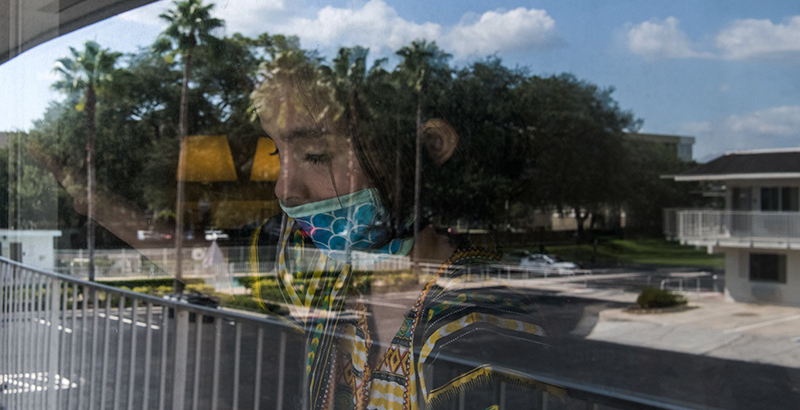Williams — It’s Our Own Damn Fault: Too Many Have Treated a COVID Catastrophe as an Inconvenience, Leaving Our Health in Grave Danger and Our Kids Locked Out of School

I yell a lot these days. Course, it’s not the same as college yelling, the hollering you do in a basement full of cheap beer and throngs of people stomping around to too much bass. Or bleacher yelling, when you’re informing the visiting right fielder of the low quality of his skill, character and breeding.
No, I am a working dad in a lengthening pandemic. I only yell in a kind of muted yell-as-stage-whisper: loud enough to clearly project my voice, but not too loud to wake up the kids. Not so loud that they hear the cracks in the facade you’ve hoisted for the past eight months.
My Washington, D.C. home plays host to two full-time jobs and three children under the age of 10. The older two kids log onto elementary school each day. The toddler and I tour our neighborhood’s construction sites and yell at cement mixers — while I miss meetings and deadlines and meals and rest.
Most of the time, I yell that ours is no longer a serious country, and how I can’t get my head around that. This shouldn’t come as a surprise, but it did. I don’t know why. Nearly a decade ago, I wrote an 189-page dissertation largely about how the United States’s political system was threatened by epistemic closure, which is to say, our collective — mostly conservative — unwillingness to engage with, discuss, and address inconvenient facts. The evidence on climate change had long been clear, but we weren’t about to do anything about it. The evidence on President Obama’s parentage and birthplace was already clear, but that didn’t stop conservatives from demagoguing about it. Tax breaks for the rich don’t “pay for themselves,” but it’s easier to pretend that they do. And so on. We’ve long been coasting, treating the tough work of self-governance as a petty game.
And yet, somehow, I’m still shocked to find us collectively here: surpassingly, embarrassingly incapable of pulling ourselves together and responding to the pandemic. Ours is literally a country struggling with the choice of whether to 1) save lives and speed our path back to normalcy, or 2) throw holiday parties. The Centers for Disease Control and Prevention are urging us not to travel for Thanksgiving. Millions of us will do it anyway. Shrug.
That’s us: a country so frivolous that experts despair of getting us to socially distance or stay home, so they resign themselves to pushing for workarounds to lessen the damage of our carelessness instead.
It is easy — and accurate — to blame the president, and his enablers in Congress, as they cheer for irresponsibility. They are determined not to confront, address, or even acknowledge the pandemic. The White House has stopped trying, and his political allies regularly snipe at those who follow the rules.
But that is also incomplete. In this, as in so many things, Donald J. Trump isn’t an aberration from America so much as an enlargement of who and what we are as a nation. He is America, only a lot more so. Trump is brash and flagrantly irresponsible. His cost-benefit calculations rarely extend beyond his immediate surroundings. He is reliably unreliable, a man who breaks things: promises, marriage vows, trust, norms, laws, rules.
And yet … how have you done on mask-wearing? Have you found an excuse to travel for the holidays yet? How big is your pod — and how honestly does everyone maintain its borders? Did you manage to sneak in a vacation? Did you really quarantine two weeks on both ends? Have you steered clear of indoor dining? Motorcycle rallies? Family get-togethers? If you faced possible exposure to the virus, did you stay home until you got a certain all-clear?
I’m beyond angry at my privileged, gentrifier peers who rushed their kids back into day care and playgroups the moment they became available, who keep hosting buddies and their families for the weekends, who keep finding a reason to hit the bar circuit (“It’s a birthday!” “A workiversary!” “A Thursday!” “The 50th anniversary of Doonesbury’s syndication in newspapers!”). I’m incredulous at their persistent lack of seriousness.
Look: maybe you didn’t catch the virus any of the times when you exempted yourself from responsibility. But you almost certainly helped spread the broader national message: that this pandemic is a problem we can work around, instead of a grave threat to human lives, our children’s learning, and our economy and society. Too many of us have treated COVID-19 as an inconvenience instead of a generational catastrophe that will mark everyone who survives it.
But now we have pandemic fatigue. Now we are tired and angry that cases are on the rise and schools can’t safely reopen for in-person instruction. I get it. Believe me, I yield to no one in my desperation for a break. In my house, we have been painstakingly disciplined in following the rules. I hate imagining how much longer we’ll have to live this way, all the color and spontaneity of human life carefully rendered down into a weekly paint-by-numbers plod. Particularly because I know that while my privileged children are still bearing up reasonably well, many millions of children — particularly those from historically marginalized communities — are not.
Well, we’ve sown, and now we’ll reap. In the face of the pandemic’s continuing, escalating spike, New York City schools closed again last Thursday. They closed the preceding week in Ames, Iowa. They’ve also begun to close in Pennsylvania’s Seneca Valley School District and Georgia’s Walker County School District and all over the country.
Blame educators and administrators for this if you must. But you’re wrong. It’s like the old Pogo comic strip: “We have met the enemy, and he is us”. We — the many, the pluribus in America’s e pluribus unum — have not yet managed to mount a serious collective response. Yes, it would be easier if we had competent leadership in the White House, or if the current administration’s malfeasance weren’t being propped up by rock-solid support from allies in the Senate. But those things aren’t going to change yet. We all know that by now.
If the tattered, eroded, assaulted institutions of U.S. democracy hold, if there is a new presidential administration in January (and perhaps a Congress less-well-stacked with pandemic-deniers) we may get some support in our piecemeal local efforts. But, until then, all we have are our choices and their consequences. May as well take — and make — them seriously.
Conor P. Williams is a fellow at the Century Foundation, a progressive think tank. All views expressed here are his alone.
Get stories like these delivered straight to your inbox. Sign up for The 74 Newsletter

;)

